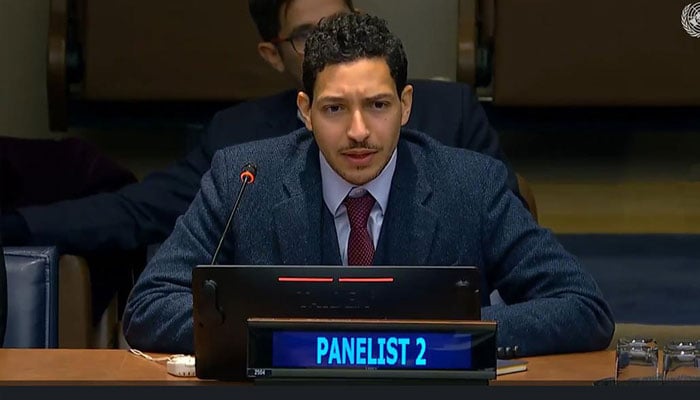‘Green transitions are acts of macroeconomic resilience’
Islamabad: Dr Amir Lebdioui from Oxford University has said that green transitions are not just environmental necessities but acts of macroeconomic resilience.
Dr Lebdioui was giving keynote address at policy clinic on "Survival of the Greenest" hosted here by Sustainable Development Policy Institute (SDPI). Dr Lebdioui who led the clinic drew inspiration from Charles Darwin's Survival of the Fittest, reimagining the concept to emphasise the survival of economies that embrace green transitions. “It’s not only species but economies that are in a race for survival, driven by technological advancements and climate imperatives,” he stated.
He highlighted the disproportionate impact of climate change on developing nations like Pakistan, which contribute minimally to global emissions yet face severe penalties, including economic losses, increased borrowing costs and disrupted supply chains. He presented the 1970s decline of Nauru, once a wealthy island nation, as a cautionary tale of unsustainable resource dependence.
“Green transitions are not just environmental necessities but acts of macroeconomic resilience,” he emphasised and outlined three primary avenues for sustainable economic transformation namely Green Windows for industrialisation embodying large-scale adoption of low-carbon technologies to drive industrial growth, Energy Transitions signifying everaging energy innovation as a cornerstone of the Fourth Industrial Revolution and Environmental Upgrading embedding green practices within supply chains to enhance productivity and sustainability.
Dr Lebdioui critiqued global economic distortions noting how industrialised nations dominate renewable energy investments despite developing countries' greater potential due to lower costs. The global north’s green protectionism limits opportunities for industrial decarbonisation in nations like Pakistan, he observed. He also stressed that effective green transitions hinge on skills development rather than resource availability.
The keynote speaker underscored the need for tailored green industrial policies aligned with local realities. Inter-ministerial coordination and private sector inclusion were identified as critical enablers of successful transitions. “Green policies must evolve and adapt to future outcomes rather than imitate models from elsewhere,” Dr Lebdioui advised.
In an era defined by intersecting crises, industrial policy offers a strategic tool to manage transitions, according to Dr Lebdioui. However, he lamented the global failure to prioritise climate commitments, pointing out the disparity in funding mobilised for wars versus environmental resilience.
Earlier, Dr Sajid Amin Javed, Deputy Executive Director SDPI, shared reflections on the institute’s journey in fostering impactful policy discussions. He underscored SDPI's commitment to advancing climate resilience and sustainable development initiatives in Pakistan.
-
 'The Muppet Show' Star Miss Piggy Gives Fans THIS Advice
'The Muppet Show' Star Miss Piggy Gives Fans THIS Advice -
 Sarah Ferguson Concerned For Princess Eugenie, Beatrice Amid Epstein Scandal
Sarah Ferguson Concerned For Princess Eugenie, Beatrice Amid Epstein Scandal -
 Uber Enters Seven New European Markets In Major Food-delivery Expansion
Uber Enters Seven New European Markets In Major Food-delivery Expansion -
 Hollywood Fights Back Against Super-realistic AI Video Tool
Hollywood Fights Back Against Super-realistic AI Video Tool -
 Meghan Markle's Father Shares Fresh Health Update
Meghan Markle's Father Shares Fresh Health Update -
 Pentagon Threatens To Cut Ties With Anthropic Over AI Safeguards Dispute
Pentagon Threatens To Cut Ties With Anthropic Over AI Safeguards Dispute -
 Samsung Galaxy Unpacked 2026: What To Expect On February 25
Samsung Galaxy Unpacked 2026: What To Expect On February 25 -
 Travis Kelce Takes Hilarious Jab At Taylor Swift In Valentine’s Day Post
Travis Kelce Takes Hilarious Jab At Taylor Swift In Valentine’s Day Post -
 NASA Confirms Arrival Of SpaceX Crew-12 Astronauts At The International Space Station
NASA Confirms Arrival Of SpaceX Crew-12 Astronauts At The International Space Station -
 Can AI Bully Humans? Bot Publicly Criticises Engineer After Code Rejection
Can AI Bully Humans? Bot Publicly Criticises Engineer After Code Rejection -
 Search For Savannah Guthrie’s Abducted Mom Enters Unthinkable Phase
Search For Savannah Guthrie’s Abducted Mom Enters Unthinkable Phase -
 Imagine Dragons Star, Dan Reynolds Recalls 'frustrating' Diagnosis
Imagine Dragons Star, Dan Reynolds Recalls 'frustrating' Diagnosis -
 Steve Jobs Once Called Google Over Single Shade Of Yellow: Here’s Why
Steve Jobs Once Called Google Over Single Shade Of Yellow: Here’s Why -
 Barack Obama Addresses UFO Mystery: Aliens Are ‘real’ But Debunks Area 51 Conspiracy Theories
Barack Obama Addresses UFO Mystery: Aliens Are ‘real’ But Debunks Area 51 Conspiracy Theories -
 Selma Blair Explains Why Multiple Sclerosis 'isn't So Scary'
Selma Blair Explains Why Multiple Sclerosis 'isn't So Scary' -
 Will Smith Surprises Wife Jada Pinkett With Unusual Gift On Valentine's Day
Will Smith Surprises Wife Jada Pinkett With Unusual Gift On Valentine's Day




